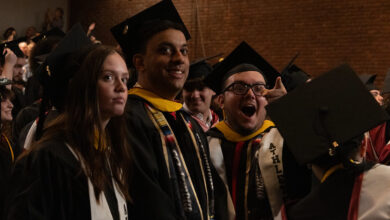Tattoo Taboos and Professionalism in the Workplace
Commentary: Times are changing- so should attitudes towards tattoos.
By Amy Guethlein
Anyone who has tattoos has likely heard this phrase as a consequence from their parents: “Now, no one is going to hire you!”
A common misconception among older generations seems to be that tattoos are career mistakes. And while this may have been true as recently as the last decade, it’s an outdated narrative evolving as tattoos have become more mainstream. In fact, studies show that not only do tattoos do not affect an individual being hired, “tattooed individuals are also just as likely, and in some instances even more likely, to gain employment.”
Our generation has been encouraged to find ourselves during our college years, and for some of us, that includes dying our hair and getting tattoos. However, it’s also the time where we’re told we need to get a job. Here lies a bit of a dilemma: do we express ourselves as who we are or, do we present ourselves based on our future career?
There is still a stigma against tattoos, with lingering biases even as tattoos increase in popularity. According to a study done in 2019, 44% of Americans have at least one tattoo. With young people joining the workforce, norms are starting to change, and stigmas are being redefined.
It was a common perspective that tattoos were seen as rebellious, irresponsible, and deviant. This belief stands in stark contrast to modern attitudes, where many people see tattoos as a form of creativity and self-expression. However, a significant number of people maintain more conservative attitudes today.
Tattoos should not contribute to hiring decisions in today’s modern work environment. The number of people with tattoos is increasing, and embracing self-expression will encourage an accepting atmosphere for both the employees and the customers. Besides, if companies are restricted to only hiring people without tattoos, it could deprive them of more appropriate candidates.
According to a survey conducted by Accountemps, one out of three hiring managers did not find any issues with visible tattoos, and even more acceptable than visible political endorsements. Over half of the managers who participated said the workplace has become more relaxed due to looser societal standards, and the other half claims the wave of new young professionals aided in the shift.
Even the Walt Disney Company has updated its policies on cast members having visible tattoos. In April of 2021, Chairman Josh D’Amaro shared that the company would be making significant changes to its dress code. For over six decades, Disney employees have followed the same conservative “Disney Look,” favoring a clean-cut appearance to stay within the frames of its timeless, family-friendly image. Now, however, cast members are allowed greater freedoms of self-expression- including visible tattoos, a move aimed at “amplifying diversity, inclusion and individual expression among its workforce.” If a wildly successful company and the epitome of wholesomeness can completely overturn its once 20-page rule book on appearance at the workplace to accept individualism, then it shouldn’t be difficult for others to follow suit.
It is clear that the subject of tattoos in the workplace remains a divisive issue. Despite perceptions of tattooed workers being ‘against-the-grain’ or coming from negative walks of life, the increased prevalence of tattoos among people in the workforce shows that societal views are shifting with each passing year. As stigma against tattoos in the workplace wanes, a work environment where personal skill and knowledge are valued over physical appearance draws ever nearer.





